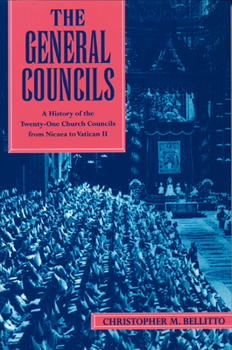The General Councils: A History of the Twenty-One Church Councils from Nicaea to Vatican II
Tracing the story of the Catholic Church's 21 general councils is one of the best ways to learn about the 2,000-year course of Christianity, affirms church historian Christopher Bellitto. In this book, sister volume to his acclaimed Renewing Christianity, he offers readers a succinct history of the 21 general councils, beginning with the First Council of Nicaea in the year 325 and ending with the Second Vatican Council in the 1960s. Bellitto organizes the councils into four parts: the councils of the early church, of the Middle Ages, of the Reformation and of modern times (Vatican I and II). And he introduces readers to the historical contexts, major tasks, achievements and failures of the councils and their impact on their times. Timely and informational, The General Councils is ideal for undergraduates and general readers. Highlights: --Ideal companion volume for Renewing Christianity ("Brilliant."--Library Journal). --Written in accessible, non-technical language. --A fast-paced read. +
Format:Paperback
Language:English
ISBN:0809140195
ISBN13:9780809140190
Release Date:November 2002
Publisher:Paulist Press
Length:176 Pages
Weight:0.59 lbs.
Dimensions:0.5" x 6.0" x 9.0"
Customer Reviews
2 ratings
Another View of the Church
Published by Thriftbooks.com User , 17 years ago
This short, well organized, clearly written, book opens a window on the church well worth looking into. It goes some way into correcting fundamentalist views of the Church as a monolithic organization run by a dictatorial head. It also sheds light on the way the Church addressed, or didn't address, problems that confronted it thru the ages. It is the kind of book worthy of small group study.
"I Will Build My Church"
Published by Thriftbooks.com User , 21 years ago
This summary of the 21 general councils recognized by the Roman Catholic Church demonstrates the value, and some of the limitations, of an historical overview. By focusing on the basic facts and immediate contexts of the councils, Christopher Bellitto enables the reader to discern the broad patterns that are intrinsic to conciliar history. Because the time period in review is virtually two millennia, however, some detail is necessarily sacrificed (though greater attention is paid to the more recent convocations -- Trent, Vatican I and II). From this book one learns that general councils are called irregularly to address pressing doctrinal controversies and disciplinary problems, that the authority of the Pope in relation to the councils has long been an issue, and that, perhaps most interestingly, conciliar decrees often have a prophetic function. Time and again, sometimes after a series of only partial successes, the councils have prepared the Church to survive and even thrive in a new historical epoch. Readers wanting more detailed discussions of the personalities, politics, and theological infighting of the councils will need to pursue further study. Nevertheless, as an introduction to this very public part of the Church's history, and as a preamble to understanding contemporary ecclesiastical developments, The General Councils is a good place to start.






